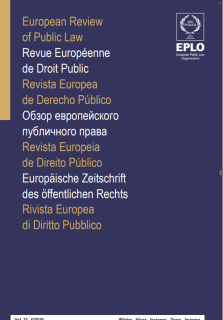
Constitutional Law / Droit constitutionnel
2019
Hungary / Hongrie
Dr. jur., Ph.D., Assistant Professor at the University of Szeged, Faculty of Law and Political Sciences,
Department of Constitutional Law (senior lecturer in Constitutional Law)
Dr. jur., Ph.D. candidate at the University of Szeged, Faculty of Law and Political Sciences,
Department of Constitutional Law
2019 has seen many interesting turns in Hungarian constitutional law. Constitutional identity was placed into the Fundamental Law (FL) - based on suggestive argumentation in key constitutional court decisions - through the Seventh Amendment in 2018, and it remains a key topic in constitutional jurisprudence regarding the relationship of EU law and national constitutional law. As it was pointed out in the latest issue of this Chronicle for 2018, the Amendment introduced a number of provisions dealing with today’s European challenges, that have kept the Constitutional Court busy in 2019 as well. Besides these milestones, the Eighth Amendment of the Hungarian Fundamental Law was also adopted and certain provisions of the Act on the Constitutional Court have been amended on several key points. In addition, a few interesting developments before the ECtHR have greatly contributed to defining the role and status of the HCC in protecting fundamental rights in the European multilevel framework created for this purpose. We summarize the above in this Chronicle.
L’année 2019 a vu beaucoup de tournants intéressants dans le droit constitutionnel hongrois. L’identité constitutionnelle a été placée dans la Loi fondamentale - sur la base d’argumentation suggestive dans des décisions clés de la Cour constitutionnelle - par le biais du Septième Amendement en 2018, et elle reste un sujet clé de la jurisprudence constitutionnelle concernant la relation entre le droit de l’UE et le droit constitutionnel national. Comme il a été souligné dans le dernier numéro de cette chronique de l’année 2018, l’Amendement a introduit un certain nombre de dispositions sur les défis européens actuels, qui ont également occupé la Cour constitutionnelle en 2019. Outre ces étapes importantes, le Huitième Amendement de la Loi fondamentale hongroise a également été adopté et certaines dispositions de la Loi sur la Cour constitutionnelle ont été modifiées sur plusieurs points clés. En outre, quelques développements intéressants devant la Cour européenne des droits de l’homme ont largement contribué à définir le rôle et le statut de la Cour constitutionnelle hongroise à la protection des droits fondamentaux dans le cadre européen à plusieurs niveaux créé à cet effet. Nous résumons ce qui précède dans cette Chronique.





















